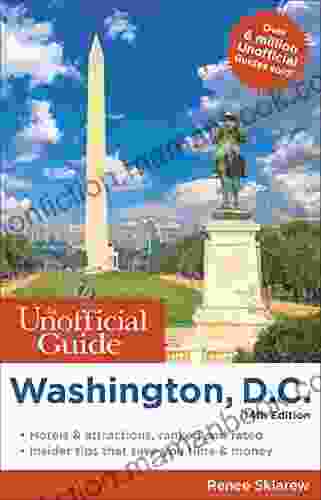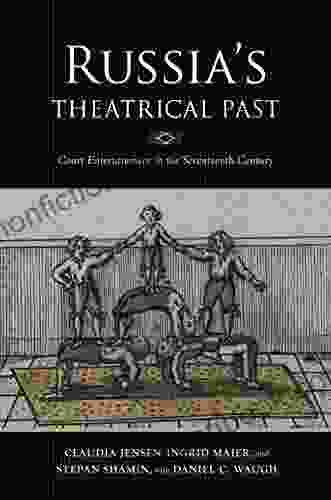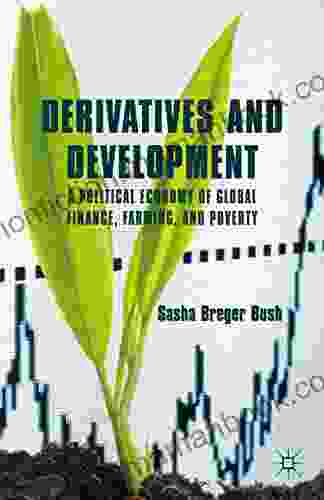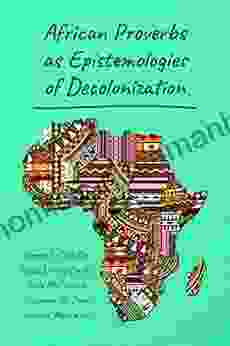African Proverbs As Epistemologies Of Decolonization: Unraveling Indigenous Knowledge Systems for Self-Determination

5 out of 5
| Language | : | English |
| File size | : | 1124 KB |
| Text-to-Speech | : | Enabled |
| Screen Reader | : | Supported |
| Enhanced typesetting | : | Enabled |
| Word Wise | : | Enabled |
| Print length | : | 303 pages |
In the tapestry of human civilization, African proverbs stand as vibrant threads, carrying the wisdom and cultural ethos of a continent steeped in history and tradition. Beyond their literal meanings, these succinct aphorisms embody profound epistemologies of decolonization, offering invaluable insights into how indigenous knowledge systems can empower communities to break free from colonial constructs and forge their own paths towards self-determination.
Unveiling the Epistemological Significance of African Proverbs
Epistemology, the study of knowledge, has long been dominated by Western perspectives, relegating indigenous knowledge systems to the periphery of academic discourse. However, African proverbs challenge this hegemony, providing a unique lens through which we can understand the ways in which different cultures construct, validate, and transmit knowledge.
Through their metaphorical language and symbolic imagery, African proverbs encapsulate complex ideas about the world, human nature, and society. They provide a rich source of information about traditional African philosophies, values, and beliefs. By analyzing the meanings and contexts of these proverbs, we can gain a deeper understanding of African epistemologies and their implications for decolonization.
Proverbs as Embodiments of Ubuntu
One of the most fundamental concepts embedded in African proverbs is Ubuntu, the quintessential African philosophy that emphasizes interconnectedness, compassion, and the interdependence of all living beings. Ubuntu recognizes the collective wisdom of the community and acknowledges the importance of maintaining harmonious relationships within society and with the natural world.
Proverbs such as "A person is a person through other persons" and "The calabash is meant to be shared" reflect the Ubuntu spirit of community and cooperation. They encourage individuals to act with compassion, empathy, and respect towards one another, fostering a sense of unity and belonging. By embodying Ubuntu, African proverbs promote decolonization by dismantling the divisive and individualistic ideologies imposed by Western colonial powers.
Proverbs as Tools for Cultural Identity and Resistance
African proverbs play a pivotal role in preserving and transmitting cultural identity. They are woven into the fabric of everyday life, passed down through generations, and used to teach children about their heritage and values. By embodying the wisdom and experiences of their ancestors, proverbs provide a sense of continuity and belonging, strengthening cultural identity and fostering a sense of pride within African communities.
Furthermore, African proverbs have been used as powerful tools of resistance against colonial oppression. During the colonial era, proverbs were employed to criticize colonial policies, advocate for independence, and mobilize communities for action. By using proverbs that resonated deeply with their audiences, African leaders and activists were able to communicate their messages in a way that was both accessible and impactful.
Empowering Communities through Indigenous Knowledge Systems
The decolonization of knowledge systems involves recognizing and valuing the knowledge and perspectives of indigenous communities, empowering them to reclaim their own cultural narratives and determine their futures. African proverbs play a crucial role in this process by providing a foundation for the development of indigenous knowledge systems that are rooted in African cultural values and experiences.
By incorporating African proverbs into education curricula, communities can ensure that their children are grounded in their own cultural heritage and equipped with the knowledge and skills necessary to address the challenges they face. Proverbs can be used to teach problem-solving, critical thinking, and decision-making, fostering self-reliance and empowering communities to take ownership of their own development.
Preservation and Revitalization of Indigenous Languages
Many African proverbs are expressed in indigenous languages, underscoring the importance of language preservation and revitalization for decolonization. Language is inextricably linked to culture and identity, and the loss of indigenous languages poses a threat to the survival of traditional knowledge systems. By promoting the use of indigenous languages, communities can safeguard their cultural heritage and ensure that future generations have access to the wisdom embedded in African proverbs.
: Embracing African Proverbs for a Decolonized Future
African proverbs are more than just wise sayings; they are epistemological tools that empower communities to decolonize their knowledge systems, reclaim their cultural identities, and forge their own paths towards self-determination. By recognizing the profound significance of African proverbs and incorporating them into education, communities can break free from the shackles of colonial constructs and create a more just and equitable world. Embracing African proverbs is a journey towards cultural revitalization, self-empowerment, and the collective liberation of African communities.
Additional Resources:
- African Proverbs as Forms of Wisdom and Knowledge: The Case of Nguni Proverbs
- Proverbs in African Discourse: The Dialogue of Voices
- Rethinking Decolonization: Towards an Indigenous Philosophy of Education in Africa
5 out of 5
| Language | : | English |
| File size | : | 1124 KB |
| Text-to-Speech | : | Enabled |
| Screen Reader | : | Supported |
| Enhanced typesetting | : | Enabled |
| Word Wise | : | Enabled |
| Print length | : | 303 pages |
Do you want to contribute by writing guest posts on this blog?
Please contact us and send us a resume of previous articles that you have written.
 Top Book
Top Book Novel
Novel Fiction
Fiction Nonfiction
Nonfiction Literature
Literature Paperback
Paperback Hardcover
Hardcover E-book
E-book Audiobook
Audiobook Bestseller
Bestseller Classic
Classic Mystery
Mystery Thriller
Thriller Romance
Romance Fantasy
Fantasy Science Fiction
Science Fiction Biography
Biography Memoir
Memoir Autobiography
Autobiography Poetry
Poetry Drama
Drama Historical Fiction
Historical Fiction Self-help
Self-help Young Adult
Young Adult Childrens Books
Childrens Books Graphic Novel
Graphic Novel Anthology
Anthology Series
Series Encyclopedia
Encyclopedia Reference
Reference Guidebook
Guidebook Textbook
Textbook Workbook
Workbook Journal
Journal Diary
Diary Manuscript
Manuscript Folio
Folio Pulp Fiction
Pulp Fiction Short Stories
Short Stories Fairy Tales
Fairy Tales Fables
Fables Mythology
Mythology Philosophy
Philosophy Religion
Religion Spirituality
Spirituality Essays
Essays Critique
Critique Commentary
Commentary Glossary
Glossary Bibliography
Bibliography Index
Index Table of Contents
Table of Contents Preface
Preface Introduction
Introduction Foreword
Foreword Afterword
Afterword Appendices
Appendices Annotations
Annotations Footnotes
Footnotes Epilogue
Epilogue Prologue
Prologue Upton Sinclair
Upton Sinclair Marta March
Marta March Dill Pickles
Dill Pickles Jean Chatzky
Jean Chatzky Patricia Hruby Powell
Patricia Hruby Powell Torkom Saraydarian
Torkom Saraydarian Bryant Simon
Bryant Simon Rubina Ramesh
Rubina Ramesh Fritz Leiber
Fritz Leiber Kimberly Owen
Kimberly Owen Mrs Molesworth
Mrs Molesworth Sarah Amber
Sarah Amber Sarah Westcott
Sarah Westcott Gary Greenberg
Gary Greenberg Brittni Chenelle
Brittni Chenelle Dr Maryellen Pickens
Dr Maryellen Pickens Deborah Bradford
Deborah Bradford Brandon Santiago
Brandon Santiago Claire Pearcy
Claire Pearcy M L Buchman
M L Buchman
Light bulbAdvertise smarter! Our strategic ad space ensures maximum exposure. Reserve your spot today!

 Curtis StewartThe Unofficial Guide to Washington: Your Unofficial Guide for Planning the...
Curtis StewartThe Unofficial Guide to Washington: Your Unofficial Guide for Planning the... Benjamin StoneFollow ·4.6k
Benjamin StoneFollow ·4.6k Raymond ParkerFollow ·11.7k
Raymond ParkerFollow ·11.7k Henry HayesFollow ·15k
Henry HayesFollow ·15k Gabriel BlairFollow ·10.3k
Gabriel BlairFollow ·10.3k Tyrone PowellFollow ·5.8k
Tyrone PowellFollow ·5.8k Winston HayesFollow ·3.9k
Winston HayesFollow ·3.9k Roy BellFollow ·6.4k
Roy BellFollow ·6.4k Miguel NelsonFollow ·8.2k
Miguel NelsonFollow ·8.2k

 Steve Carter
Steve CarterUnveiling the Rich Theatrical Tapestry of Russia: A...
Origins and Early...

 Frank Butler
Frank ButlerOn Talking Terms With Dogs: Calming Signals and the...
For centuries, dogs have...

 Leo Tolstoy
Leo TolstoyThe Inside Guide to Applying and Succeeding in...
Applying to...

 Cole Powell
Cole PowellThe Political Economy of Global Finance, Farming and...
The global...
5 out of 5
| Language | : | English |
| File size | : | 1124 KB |
| Text-to-Speech | : | Enabled |
| Screen Reader | : | Supported |
| Enhanced typesetting | : | Enabled |
| Word Wise | : | Enabled |
| Print length | : | 303 pages |













